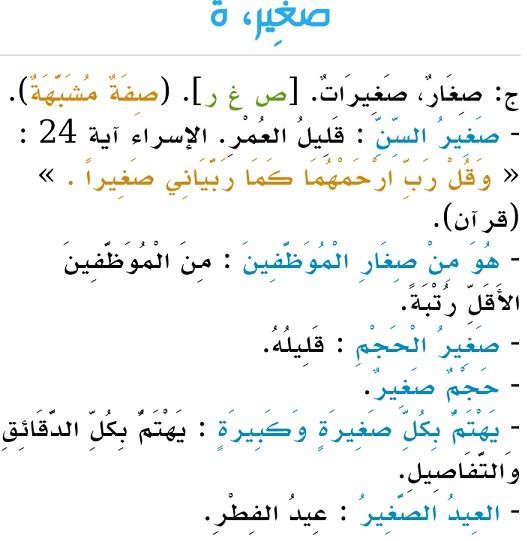30 Common Opposites in Arabic with Examples Posted by Ibnulyemen اِبْنُ اليَمَن on Aug 3, 2017 in Pronunciation, Vocabulary
When learning a foreign language, a successful way to augment our vocabulary is through opposites. These words are used to describe people and/or things, hence commonly known as ‘adjectives.’ Even though they have other names in Arabic grammar, for now look at this list, go over it periodically and several times for speedier and lasting retention. Also, check this earlier post for more.
| Positive | Negative | Example |
| حَلَال ‘lawful’ Halaal | حَرَام ‘unlawful’ Haraam | هَذَا لَحْم حَلَال.
‘this is Halal meat. |
| كَثِيْر ‘a lot’ kathiir | قَلِيْل ‘little’ qaliil | المَطَر كَثِيْر اليوم.
‘the rain is a lot today.’ |
| طَيِّب ‘agreeable’ Tayiib | شِرِّيْر ‘evil’ shirriir | جُوْن رَجُل طَيِّب.
‘John is an agreeable man.’ |
| شُجَاع ‘courageous’ shujaa‘ | جَبَان ‘coward’ jabaan | أَنْتَ شَخْص شُجَاع.
‘you are a courageous person.’ |
| كَرِيْم ‘generous’ kariim’ | بَخِيْل ‘stingy’ bakhiil | أَحْمَد كَرِيم جِدًا.
‘Ahmed is very generous.’ |
| نَظِيْف ‘clean’ naDiif | وَسِخ ‘dirty’ wasikh | الشَّارِع نَظِيْف.
‘the street is clean.’ |
| حِلْو ‘sweet’ Hilw | مُرّ ‘bitter’ murr | الشَّاي حِلْو جِدًا.
‘the tea is too sweet.’ |
| حَار ‘hot’ Haar | بَارِد ‘cold’ baarid | الجَوّ حَار اليَوْم.
‘the weather is hot today.’ |
| جَدِيْد ‘new’ jadiid | قَدِيْم ‘old’ qadiim | القَمِيْص جَدِيْد.
‘the shirt is new.’ |
| أَبْيَض ‘white’ abyaDH | أَسْوَد ‘black’ aswad | الحِصَان أَبٍيَض.
‘the horse is white.’ |
| قَوِيْ ‘strong’ qawii | ضَعِيْف ‘weak’ dha‘iif | المُلاكِم الجَدِيْد قَوِي.
‘the new boxer is strong.’ |
| رَشِيْق ‘slim’ rashiiq | سَمِيْن ‘fat’ samiin | سَوْسَن رَشِيْقَة وجَمِيْلَة.
‘Sawsan is slim and pretty.’ |
| فَرْحَان ‘delighted’ farHaan | زَعْلَان ‘upset’ za‘laan | أَنَا فَرْحَان بالفَوْز.
‘I am delighted with victory.’ |
| سَعِيْد ‘happy’ sa‘iid | حَزِيْن ‘unhappy’ Haziin | هُوَ سَعِيْد بِالفُوْز أَيْضًا.
‘he’s delight with victory too.’ |
| شَبْعَان ‘full’ shab‘aan | جَوْعَان ‘hungry’ jaw‘aan | أَنَا شَبْعَان، شُكْرًا!
‘I am full, thank you! |
| بَسِيْط ‘simple’ basiiT | خَبِيْث ‘vicious’ khabiith | عَلِيْ رَجُل بَسِيْط.
‘Ali is a simple man.’ |
| نَاجِح ‘successful’ naajiH | فَاشِل ‘unsuccessful’ faashil | جُوْن شَخْص نَاجِح.
‘John is a successful man.’ |
| رَزِيْن ‘composed’ raziin | سَخِيْف ‘silly’ sakhiif | إَنَّهُ رَزِيْن.
‘he’s certainly composed.’ |
| حَكِيْم ‘wise’ Hakiim | جَاهِل ‘ignorant’ jaahil | يَا لَكَ مِنْ حَكِيْم!
‘how wise of you!’ |
| خَفِيْف ‘light’ khafiif | ثَقِيْل ‘heavy’ thaqiil | الشَّنْطَة خَفِيْفَة.
‘the suitcase is light.’ |
| أَمِيْن ‘honest’ ’amiin | خَائِن ‘dishonest’ khaa’in | يَا لَهُ مِن رَجُل أَمِيْن.
‘what an honest man he is!’ |
| صَادِق ‘truthful’ Saadiq | كَذَّاب ‘liar’ kadhdhaab | هُوَ صَادِق دَائِمًا.
‘he is always truthful.’ |
| مَحْبُوب ‘likeable’ maHbuub | مَكْرُوه ‘unpleasant’ makrooh | مِيْسِي لاعِب مَحْبُوب.
‘Messi is a likable player.’ |
| غَالِي ‘expensive’ ghaalii | رَخِيْص ‘cheap’ rakhiiS | السَّكَن غَالِي فِي نيويورك.
‘housing is expensive in New York.’ |
| سَهْل ‘easy’ sahl | صَعْب ‘difficulty’ Sa‘b | الاِمْتَحَان سَهْل اليَوْم.
‘the test is easy today.’ |
| قَرِيْب ‘near’ qariib | بَعِيْد ‘far’ ba‘iid | المَطَار قَرِيْب مِن هُنَا.
‘the airport is near here.’ |
| هُنَا ‘here’ hunaa | هُنَاك ‘there’ hunaak | هُنَا أَسْكُن، فِي هَذِهِ العِمَارَة.
‘I live here, in this building.’ |
| فَقِيْر ‘poor’ faqiir | غَنِيّ ‘rich’ ghanii | سَام فَقِيْر.
‘Sam is poor.’ |
| مُتَزَوِّج ‘married’ mutazawwij | عَازِب ‘unmarried’ ‘aazib | مَايْكِل مُتَزَوِّج بِإيفا.
‘Michael is married to Eva.’ |
| وَاسِع ‘wide’ waasi‘ | ضَيِّق ‘narrow’ DHayiiq | الشَّارِع وَاسِع.
‘the street is wide.’ |
Notes on pronunciation:
| · H (capital ‘h’) = ح | · T (capital ‘t’) = ط | · T (capital ‘t’) = ط |
| · ‘ = ع | · kh = خ | · D (capital ‘d’) = ظ |
| · DH (capital ‘dh’) = ض | · ’ = ء | · S (capital ‘s’) = ص |
| · dh (small ‘dh’) = ذ | · gh (small gh) = غ | · |
Note on Usage:
- All the example sentences are nominal; therefore, ‘adjectives’ are always used only in them. Normally, they occur in second position which is called خَبَر khabar ‘predicate’, and the noun in the first position is called مُبْتَدَأ mubtada’ ‘subject or topic’.
Exercise:
Attempt to use the negative adjectives in similar sentences.

Build vocabulary, practice pronunciation, and more with Transparent Language Online. Available anytime, anywhere, on any device.





Comments:
Abu Mustafa:
Best post in ages. Great work. Thanks.
Ibnulyemen:
@Abu Mustafa Shukran, ya Aba Mustafa.
Muhammad kashif malik:
جزاك الله خير I am learning many things. Allah will give you the reward for this great job.you are teaching arabic, the language of رسول الله صلي الله عليه وسلم to those who love to learn this beautiful language.
Ibnulyemen:
@Muhammad kashif malik شكرًا جزيلاً ya Mohammad, I am delighted that this is informative to you.